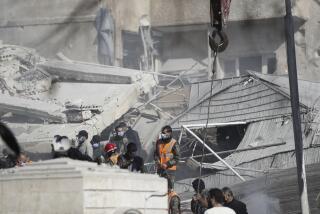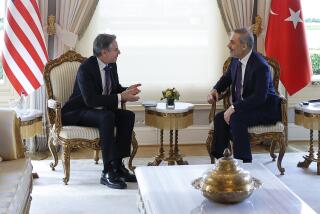Former U.N. chief Kofi Annan to make peace trip to Syria
Former United Nations chief Kofi Annan is scheduled to be in Syria on Saturday on a special peace mission, but the veteran diplomat faces daunting obstacles in trying to craft a cease-fire in the almost yearlong conflict that has cost thousands of lives.
Annan, a joint special envoy of the United Nations and the Arab League, will meet Saturday in Damascus, the Syrian capital, with President Bashar Assad, U.N. Secretary-General Ban Ki-moon told reporters Friday.
On the eve of his trip, opposition activists reported scores more killed across Syria as the now-traditional Friday protests took place in many parts of the country.
Annan’s trip to Damascus comes as the crisis in Syria appears to have reached an impasse amid fear that it could disintegrate into a full-fledged civil war in the heart of the Middle East, with broad geopolitical implications.
The former U.N. chief must walk a diplomatic tightrope, balancing the demands of some nations — including the United States — that Assad must go, against the wishes of other countries, notably Russia, China and Iran, that seek a negotiated settlement while Assad retains power.
Annan has already angered Syrian dissidents by ruling out further “militarization” of the conflict, signaling his preference for a negotiated settlement with Assad’s government. Various opposition groups, including the umbrella Syrian National Council, have rejected any talks with Assad and say the president must stand down.
“We don’t accept any dialogue with Bashar,” said Radwan Ziadeh, a U.S.-based spokesman for the Syrian National Council. “He committed many crimes and should be held responsible for that. We are open to dialogue with other government members, but not with Assad himself.”
Annan has indicated his preference for dialogue, a word no longer in the lexicon of much of the opposition, at least as far as Assad is concerned.
The Syrian government has said it is committed to dialogue with the opposition, but its definition of the opposition seems to exclude those groups and individuals seeking Assad’s ouster. Damascus depicts the almost yearlong rebellion as the work of foreign-backed “terrorists” and Islamic militants.
Groups seeking to oust Assad have also called on the international community for various forms of military assistance, including arming Syria’s rebels or instituting a no-fly zone over parts of Syria, as a Western-led alliance did last year in Libya, contributing to the downfall of Moammar Kadafi. Syrian insurgents complain that their weapons are no match for the government’s firepower, including tanks and artillery.
Another suggestion backed by some opposition groups is for the international community to open up humanitarian corridors, or “safe zones,” inside Syria, allowing civilians and dissidents to assemble, shielded from government attack. Any such proposal would probably require some kind of foreign military protection.
But Annan, in remarks in Cairo on Thursday, said he sought a “political settlement” that was “Syrian-led and Syrian-owned,” clearly rebuffing any plan to introduce more arms or foreign troops into the region.
“I hope no one is thinking seriously of using force in this situation,” Annan said.
Al Jazeera quoted U.S. Sen. John McCain (R-Ariz.) as saying the former U.N. chief’s comments made him “wonder what planet Mr. Kofi Annan is on.”
The Arizona senator has called for the arming of Syria’s rebels, a step that the Obama administration says is premature. The White House is also looking for a “political solution” to the crisis, though President Obama has called for Assad to step down.
Annan’s comments on Syria would seem to align him with the position of Russia and China, which have both called for dialogue between the government and the opposition. The two superpowers vetoed a U.N. Security Council resolution that would have called for Assad to relinquish power. But both welcomed Annan’s peace trip to Syria, as did the Syrian government.
Annan is widely respected, but many experts say it is unlikely he can persuade Assad to cede power. The Syrian president, whose family has ruled the nation for more than 40 years, insists he is implementing democratic reforms, including a newly approved constitution, steps dismissed as a sham by the opposition.
Nonetheless, the International Crisis Group, a Brussels-based think tank, said this week that Annan’s visit “arguably offers a chance to rescue fading prospects for a negotiated transition.” Annan’s “best hope,” the group argued, lies in enlisting international — and especially Russian — support for a plan calling for “an early transfer of power that preserves the integrity of key state institutions.”
Syria already rejected an Arab League plan that called for Assad to turn over power to his deputy as part of a transition to a more democratic government. Russia criticized that plan as “unbalanced” when it came before the United Nations. There has been no indication from Moscow that Russia has changed its position on Assad, a longtime ally.
In Syria, the Local Coordination Committees, an opposition network, reported at least 82 more deaths Friday, including 33 in the northwest province of Idlib and 26 in the province of Homs, which has suffered the most casualties in the conflict. The numbers could not be independently verified as access to Syria is limited.
The official Syrian government news agency blamed terrorists for killing an 11-year-old boy in Homs, robbing a food center in Idlib and battling authorities in the central province of Hama.
The United Nations estimates that more than 7,500 people have been killed since protests against Assad broke out almost a year ago. The Syrian government says more than 2,000 security personnel have been killed.
Sandels is a special correspondent.
More to Read
Start your day right
Sign up for Essential California for news, features and recommendations from the L.A. Times and beyond in your inbox six days a week.
You may occasionally receive promotional content from the Los Angeles Times.





